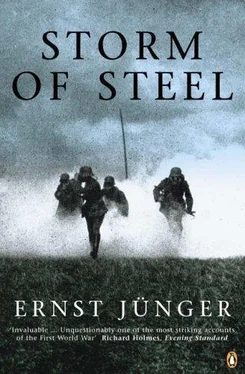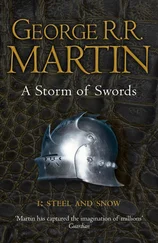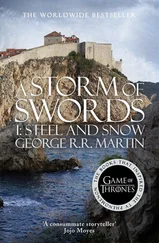But to get back to my refuge, which I named ‘Casa Wahnfried’. My only worry was its relative porosity; though it was secure enough, so long as nothing landed on top of it. At any rate, I was comforted by the thought that I was no better off than my men. At lunchtime, Haller would lay a blanket in a huge crater, which we had made a path to, for me to use as a suntrap. There, I would work on my tan, disturbed, on occasion, by shells or whizzing fragments of metal coming too near.
The nights brought heavy bombardments like swift, devastating summer thunderstorms. I would lie on my bunk on a mattress of fresh grass, and listen, with a strange and quite unjustified feeling of security, to the explosions all around that sent the sand trickling out of the walls. Or I would walk out to the fire-step to take in the mournful nocturnal scene, and the strange contrast between its heaviness and the fiery spectacle whose dance-floor it was.
At such moments, there crept over me a mood I hadn’t known before. A profound reorientation, a reaction to so much time spent so intensely, on the edge. The seasons followed one another, it was winter and then it was summer again, but it was still war. I felt I had got tired, and used to the aspect of war, but it was from this familiarity that I observed what was in front of me in a new and subdued light. Things were less dazzlingly distinct. And I felt that the purpose with which I had gone out to fight had been used up, and no longer held. The war posed new, deeper puzzles. It was a strange time altogether.
The front line had relatively little to suffer from the enemy bombardment, which was just as well, because it could not have held if it had. It was principally Puisieux and the hollows around that were targets for the bombardments that in the evenings worked themselves up into extraordinary ferocity. Bringing food and relieving other units were both greatly complicated. Now here, now there, a chance hit would knock out a link of our chain.
On 14 June, I was relieved at two in the morning by Kius, who like me had come back and was now commanding the 2nd Company. We spent our rest period at the railway embankment at Achiet-le-Grand, in barracks and shelters in the lee of its protective bulk. The British often sent heavy low-trajectory shells our way. Rackebrand, a sergeant with the 3rd Company, fell victim to one such. He was killed by a shard that drilled through the wall of the flimsy hut that he had set up as a company office on top of the embankment. A few days before that, there had been a real catastrophe. A bomber pilot had dropped a bomb right on top of the 76th regimental band as it was playing, surrounded by listeners. Among its victims were many men from our regiment.
In the vicinity of the embankment, looking like stranded hulls, were many shot-up tanks, which I would inspect closely in the course of my peregrinations. Also, I would have my company cluster round them to study methods of combating them, their tactics and their weak points – these ever-more commonly seen elephants of the technical war. They carried names and emblems and designs that were variously ironic, menacing or lucky; there was the clover leaf and the pig (for luck), and the white death’s head. One was distinguished by a gallows with a noose dangling from it; that one was called ‘Judge Jeffries’. All of them were in a bad way. To be in the narrow turret of such a tank, going forward, with its tangle of rods and wires and poles, must have been extremely unpleasant as these colossuses, in efforts to outmanoeuvre the artillery, were forced to zigzag over the country like huge helpless beetles. I felt keen sympathy for the men in those fiery furnaces. Also, the countryside was dotted about with the skeletal wreckage of downed aeroplanes, an indication that machines were playing an ever greater part on the battlefield.
One afternoon, not far from us, the huge white bell of a parachute came down, as a pilot leaped from his burning aeroplane.
On the morning of 18 June, on account of the volatile situation, the 7th was obliged to go back to Puisieux ahead of time, to be at the disposal of the commanding officer of the line troops for carrying parties and other purposes. We moved into shelters and basements facing out towards Bucquoy. Just as we arrived there, a group of heavy shells came down in the surrounding gardens. Even so, I wasn’t deterred from taking my breakfast in a little gazebo in front of my shelter. After a while there was another one came whistling across. I dropped flat on the ground. Flames spurted beside me. An ambulanceman in my company by the name of Kenziora, who was just bringing several cooking pans full of water, fell, hit in the stomach. I ran over to him, and with the help of a signalman, dragged him into the dressing-station, whose entrance, as luck would have it, was just opposite the place where the shell burst.
‘Well, did you at least have a proper breakfast inside you?’ asked Doctor Koppen, a real old sawbones, who had had me under him once or twice in his time, as he bandaged up the big wound in his belly.
‘Yes, I did, a big dixie full of noodles!’ whimpered the unhappy fellow, perhaps catching a ray of hope.
‘Well, there you are then,’ Koppen said reassuringly, before turning aside to me and nodding at me with a grave expression on his face.
But gravely wounded men have very acute instincts. Suddenly the man groaned, and large beads of sweat stood out on his forehead: ‘That shell’s done for me, I can feel it.’ But in spite of his prediction, I was able to shake his hand six months later, when the regiment returned to Hanover.
In the afternoon, I took a solitary walk through the devastated village of Puisieux. It had already received a hammering in the course of the battles of the Somme. The craters and ruins had been overgrown with thick grass, dotted about here and there with the gleaming white plates of elderflower, which loves ruins. Numerous fresh explosions had ripped holes in the cover, and exposed the soil all over again.
The main village street was lined with the debris of our recent stalled advance. Shot-up wagons, discarded munitions, rusty pistols and the outlines of half-decomposed horses, seen through fizzing clouds of dazzling flies, commented on the nullity of everything in battle. All that was left of the church standing on the highest spot of the village was a wretched heap of stones. While I picked a bunch of half-wild roses, landing shells reminded me to be careful in this place where Death danced.
A few days later, we relieved the 9th Company in the line of resistance, some five hundred yards behind the front. In the process, we of the 7th suffered three men wounded. The following morning, just by my dugout, Captain von Ledebur was wounded in the foot by a shrapnel ball. Even though he had galloping consumption, he felt the war was his vocation. It was his fate to succumb to that slight wound. He died soon after, in hospital. On the 28th, the commander of my ration party, Sergeant Gruner, was hit by a shell splinter. That was our ninth casualty in a short space of time.
Following a week on the front line, we were again moved back to the resistance line, since the battalion which was to relieve us was almost wiped out by Spanish influenza. Several men a day reported sick in our company as well. In the division next to ours, the epidemic raged to such an extent that an enemy airman dropped leaflets promising that the British would come and relieve them, if the unit weren’t withdrawn. But we learned that the sickness was also spreading among the enemy; even though we, with our poor rations, were more prone to it. Young men in particular sometimes died overnight. And all the time we were to be battle-ready, as there was a continuous cloud of black smoke hanging over Copse 125 at all times, as over a witches’ cauldron.
Читать дальше












